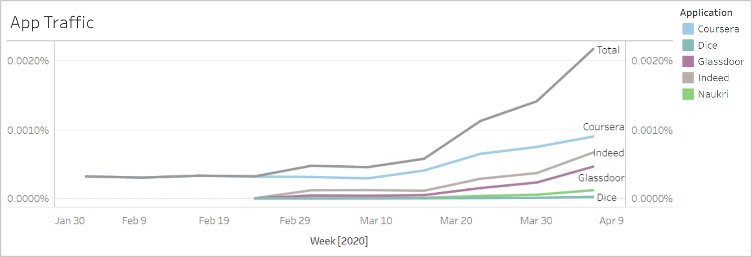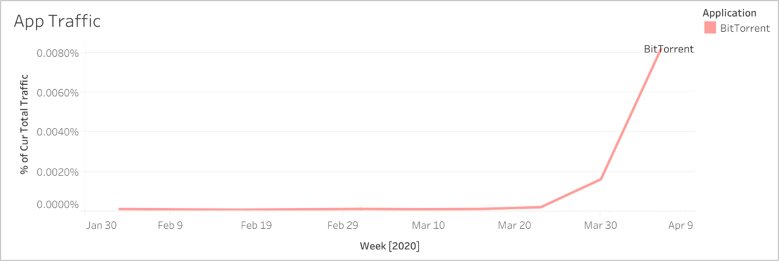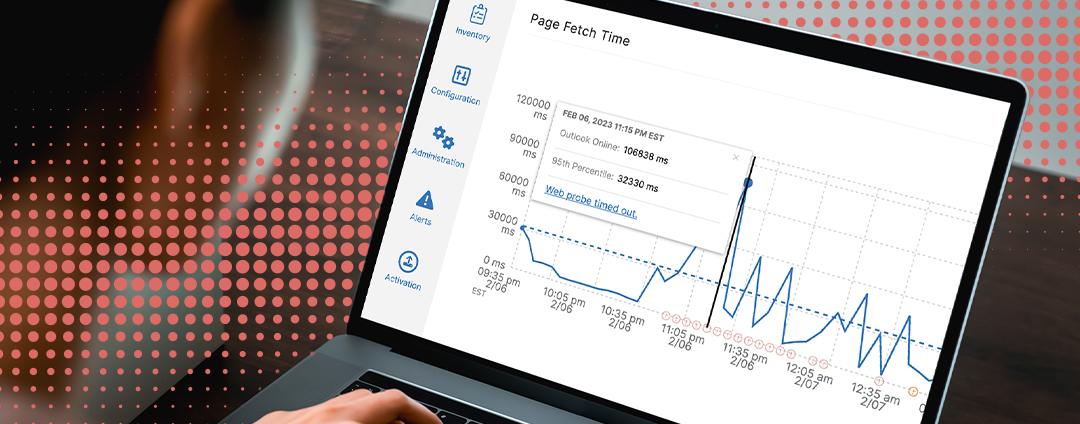Internet traffic to job sites like Indeed and Glassdoor are surging as unemployment numbers in the U.S. approach Great Depression levels. Employees are watching a lot of Netflix and, while they continue to visit online shopping sites like Amazon, they’re doing more browsing and less buying.
Those are some of the insights derived from an analysis of the internet traffic patterns of employees who work at the more than 4,000 companies that rely on Zscaler for their cloud security. For context, every time an employee of one of those companies goes online, whether they are working from home or in the office, they connect to the internet via the Zscaler cloud. Zscaler’s cloud security platform secures 100 billion transactions daily from our customers. The graphs below show the percentage of those transactions going to specific sites over the past eight weeks. Under normal circumstances, the relative distribution of transactions to various sites remains generally constant. You can see in the graphs that dramatic changes begin to appear in mid-March, aligned with a majority of the workforce working from home.
Job sites had the most dramatic spikes
Last week, 5.2 million Americans filed for unemployment, putting the four-week total at 22 million. Add the 7 million workers who were unemployed prior to the COVID-19 pandemic, and the real unemployment rate approaches a staggering 18 percent. So, it’s sadly not a surprise that employees who are fortunate to have a job and work from home are visiting job sites (e.g. Indeed, Dice, Glassdoor, Naukri) and online learning platforms (e.g. Coursera) five times more than normal, as economic uncertainty and the possibility of job loss loom. The irony, of course, is that job openings themselves have fallen off a cliff, with Indeed reporting that new job postings are down 49 percent year-over-year. This data is particularly interesting considering most of the people who were searching on these sites via Zscaler are searching from their business laptops and are presumably employed for the most part.

When it comes to online shopping, traffic to Amazon, which dwarfs all of the other retail sites, has taken a slight hit over the past few weeks. Shipping is delayed by weeks and popular items are frequently out of stock. Sites like Walmart-owned Flipkart in India have suspended delivery in the midst of the lockdown in India. PayPal usage has tumbled, indicating that consumers are still browsing but not pulling the trigger on online purchases.

COVID-19 and working from home
With stay-at-home orders happening in various countries and states around the world, collaboration tools have become mission-critical for employees who need to interact with their co-workers. The main beneficiary has been Zoom, which offers a free option for up to 100 participants for up to 40 minutes at a time. In addition to business meetings, we’ve all seen the examples of Zoom meetings acting as a virtual substitute for family gatherings, religious services and, yes, happy hours as well.
Despite Zoom’s surge in popularity, Microsoft still dominates business collaboration. Microsoft Teams tops all competitors in total collaboration traffic.

Socially distant social media
Facebook and Instagram traffic has been declining since mid-March. One possible explanation is that with everyone homebound, there are no vacation pictures to post, no shots of dinners with friends, no pics of the kids at their soccer games or dance recitals.

But one thing we know people are doing is streaming movies. Employees are watching more Netflix on their office devices while working from home during COVID-19. A quick Tiger King episode in between those Zoom calls never hurts! In the office, streaming music on Spotify was discreet and more popular.

BitTorrent usage has spiked, indicating that employees may be downloading pirated content that is often laced with malware. Employees tend to be more careful about what they download in the office and take more liberties at home. Organizations should make sure consistent policies are applied regardless of location. The Zscaler platform allows you to do just that.

These are extraordinary and unprecedented times. COVID-19 has fundamentally changed how we live and work. Businesses are being forced to think about how they can continue to operate productively when most of their employees are required to work from home. At Zscaler, we have built a cloud platform operating in 150 data centers across the world that sits in between employees and applications they access, providing them a secure and fast user experience. We operate in 185 countries and have granular visibility into an organization’s user traffic patterns as we scan it for security and policy compliance.
When this pandemic over, I think many of us will look back on it with a kind of appreciation. Specifically, we can all relish the fact that the isolation, quarantine, work from home, and physical distance that had to be kept was made that much more tolerable by our ability to engage in secure digital interactions and video calls and by our access to as much information and entertainment we wished to consume. That, and jigsaw puzzles, too, of course.
Best wishes for good health to you and your families.
Amit Sinha is the Zscaler President of R&D, Operations & Customer Service, CTO





